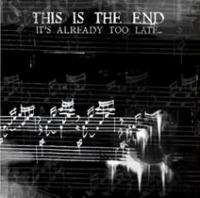Post-classic rock.
The hell? I don't know either, but that's apparently what Wisconsin's This Is the End want to be considered. So, are they mixing Sigur Rós, Bach, and Red Hot Chilli Peppers? Not quite, but that's not to say the band doesn't mix some style elements.
I wouldn't go so far as to say the band is having an identity crisis, but the crunchy guitars on "Carter Ding" don't go so well with the elevator jazz that starts the song off, but they continue to cross genre lines for the rest of the song anyhow. The band's multi-layered rhythm section works fairly well for them, providing some pretty catchy and engaging moments, at least when coupled with their three-part harmonies. The middle of the song sees TITE venturing into some improvisational funk territory, and while I appreciate the diversity, I can't help but think it sounds a little âoff' when compared with the rest of the song. They don't continue in that vein until the seven-minute "Thoughts Run Red," in which a deep funky groove provided by bassist Beau Strangles and keyboardist Lincun Guns makes the song far more interesting than the 20-second foray a few songs back. They actually have time to let the grooves run their course, rather than just be an interlude. The transition from poppish rock to blues-funk is an abrupt one, but this longer track is realization of what the foursome is trying to do. The funky elements continue until the vocals cease, and then after some solid blues licks, the vocals come back for a bit, until the guitarists bring it to a close with their skillful shredding. In a song with more stages than the 12-step program, This Is the End are finally able to play to their potential.
While they probably should have ended it there, one track was remaining, and through a lot of skillful guitar work, and keyboards bearing strong organ resemblance, they ended the album in a pretty strong fashion, but it begs the question, what happened with the first four songs? Not horrible, but they don't follow the same path as the last two, and they suffer for it. If every song could present the grooves, rhythms and melodies of the final two songs, it'd be a much tighter product.
It'll be interesting to see where they go from here, and how their take on "post-classic rock" develops. Hopefully It's Already Too Late are just the negatives.
